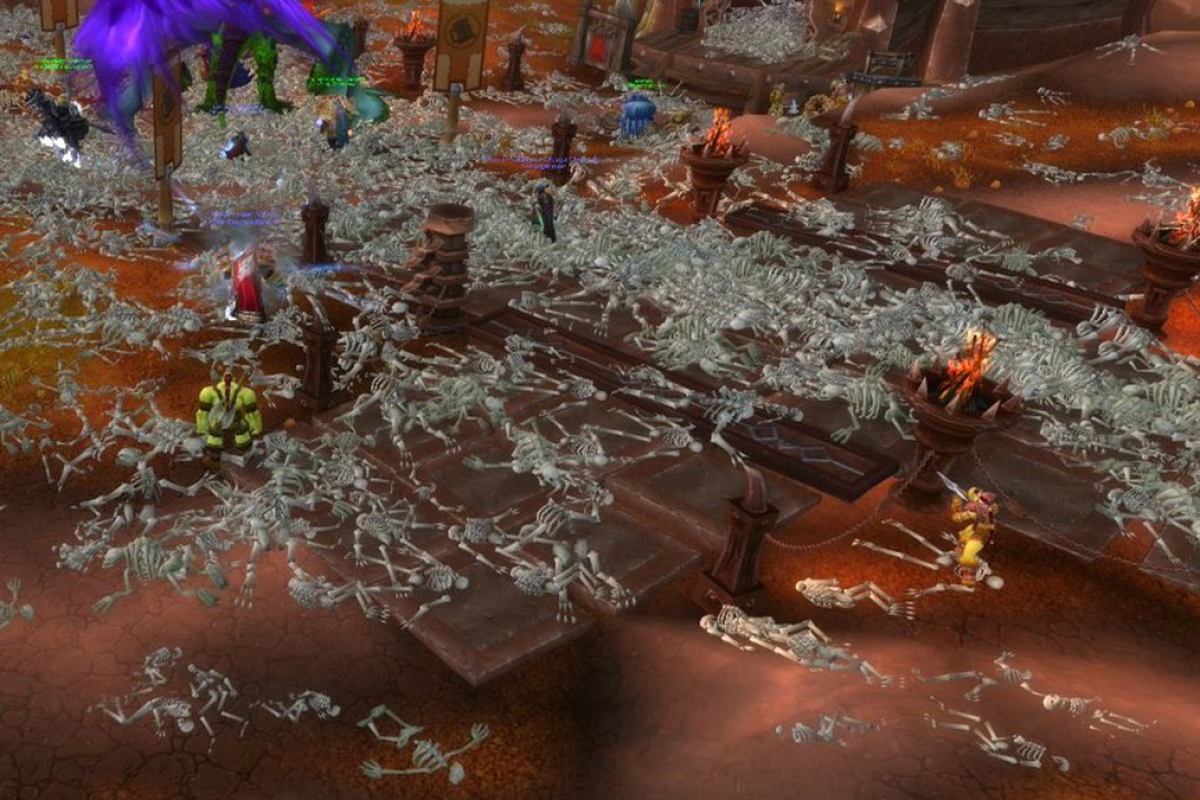Let’s face it: we humans aren’t too good at this whole pandemic thing. We can’t consistently wear masks, socially distance, or even isolate appropriately in the event of a fast spreading disease. For many scientists, it’s infuriating; how can you model something like COVID when humans behave so irrationally? Unless…

Enter World of Warcraft (WoW), a Massive Multiplayer Online (MMO) game where players live and interact in real time. Back in 2005, developers released an update to the game which added a new region and a new high-level raid boss: Hakkar the Soulflayer. One mechanic in the new Hakkar fight to challenge players was a debuff called Corrupted Blood — Players infected with Corrupted Blood would lose health over time, and they would spread it to other players if they got too close. The developers intended for this debuff to remain isolated to Hakkar and his lair, but a small glitch allowed Corrupted Blood to be spread outside of the quest area.
Within hours of the update, players were returning from the Hakkar fight, unknowingly bringing with them a deadly disease. Corrupted Blood began to quickly propagate through the cities and hubs that players would converge at, leaving trails of destruction in its wake. High level players could ignore it, for it posed relatively low risk with their large health-pools; however, low level players infected with Corrupted Blood would stand little change, and they soon began to die in droves. Additionally, Non-Player Characters (NPCs) could contract Corrupted Blood and spread it to players. This essentially modeled asymptomatic carriers as the NPCs could not die from the disease.

As Corrupted Blood spread from city to city, a few patterns began to emerge among the WoW community. Players would intentionally travel to infected cities, mimicking the behavior of real life journalists. In the process, they contracted the disease, then proceeded to spread it once they left. Other players tried to act as first responders to the epidemic — They would go to affected areas and attempt to use healing spells to help others. Unfortunately, this soon began to backfire as these first responders would contract Corrupted Blood themselves then spread it if they left the area. High level players would ignore it as a minor annoyance, and in the process they would spread the disease to new areas instead of isolating themselves. Some players even tried to intentionally spread the disease (sounds like a University of Alabama COVID party…). The developers of WoW attempted to lockdown the major epicenters of the outbreak, but as soon as the lockdown was announced players quickly left these cities before it went into effect.
A week later, the frantic developers reset the servers to eliminate Corrupted Blood once and for all. Despite the frustration caused to players, some good came from the event. Eric Lofgren, an epidemiologist at Tufts University, was one of the many players who played during the Corrupted Blood epidemic. Lofgren found the virtual epidemic, and players’ responses to it, fascinating, and he later wrote a paper on the event. Suffice to say, the unexpected behavior of humans in the game bears shocking similarity to the current pandemic. Perhaps we can learn more from how people behave online than we thought.


What an interesting look into human behavior, and I’ve found Lofgren’s paper which has now made its way onto my “to read” list. People not taking a virus or disease seriously is understandable to a point in a video game, but when their actions are mirrored in real life it does make you wonder…..
Did you come across this by happenstance, its relation to disease, or an interested in video games? Or a mixture I guess? I’m a big fan of video games myself, if you ever want to nerd a bit.
P.S. I don’t know if you’ve submitted this for a grade yet or not on Canvas, but I noticed a lack of citations in this post. If you can fix it before it’s graded, you might save yourself a few points.
Thanks for the reminder! Totally forgot to put in the links, oopsie. Lofgren’s paper is linked now if anyone else wants to check it out. I actually first heard about this one around a year ago, I forget exactly how. Usually I will just do research on anything weird I may happen to see on youtube or reddit to find the ideas for these posts. I don’t personally play WoW, but a couple friends of mine do.
This is extremely interesting considering our current circumstances. I personally am not really into video games, but my brothers love them. It’s interesting how many games become so life-like and reflect everyday behavior. Because of that, I think video games like this one is extremely useful for research purposes or educating others. Maybe we can message our senators with a link to your post! (haha, but that would be cool)
Hi Jonathan! I like how you went into detail to carefully explain this game, especially for those like me who greatly lack background knowledge when it comes to video games. It’s amazing to me that the way people act online can be mirrored in real life… I wonder what else online gaming can tell us about people.
Only thing they didnt predict was that it was all bullsh%& and caused serious psychological harm to the world…